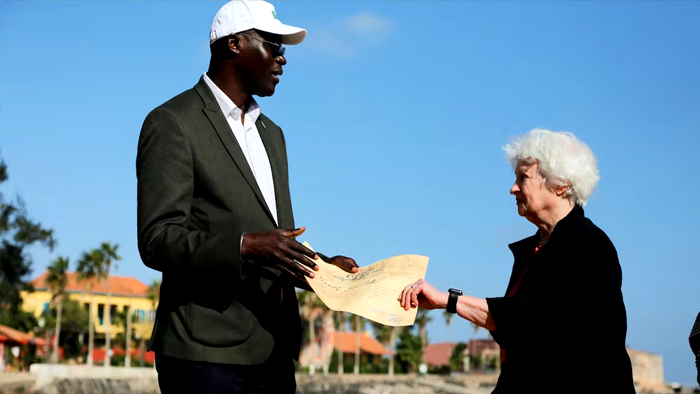The goal of U.S. Treasury Secretary Janet Yellen’s three-country trip to Africa is to show the continent that the U.S. is a true partner that is here for the long haul.
But after decades of losing ground to China and the chaos of the Donald Trump years, when the former president threatened to cut aid and reduce military support, it is hard to sell.
Africa is struggling economically because of the COVID-19 pandemic, the war in Ukraine, and, most importantly, Washington’s own monetary policy. Africans want proof that the United States will stick to its plan this time.
So far, Yellen has worked hard to give guarantees.
Related: Analysis: Turkey and its markets are headed for a crossroads with the election.
“I honestly don’t know how I can give assurances,” she said in an interview with Reuters while travelling from Senegal to Zambia. She said that both Republicans and Democrats support long-running programmes, such as those in health and trade.
Yellen’s trip is the first of a year of high-level U.S. visits that will include President Joe Biden, Vice President Kamala Harris, Trade Representative Katherine Tai, and Commerce Secretary Gina Raimondo.
In December, African leaders from 49 countries and the African Union met in Washington for a summit. Vice President Joe Biden told them that the U.S. was “all in” on Africa’s future and would spend $55 billion on it over the next three years.
Most African leaders have been glad to see the US get involved again. But the timing, two years into Biden’s four-year term, is seen by many as “late and kind of half-hearted,” said Chris Ogunmodede, a Nigerian researcher and associate editor of World Politics Review.
“There are definitely fears that Biden won’t do what he says he will do or that he could lose and be replaced by a hostile Republican administration,” he said.
China’s Debt and Interest Rates
While the US talks about its long-standing ties to Africa and its renewed commitment to increasing trade and investment, it is playing catch-up with China and facing a growing challenge from Russia.
China does about four times as much business with Africa as the U.S., and Beijing has become a major creditor by giving cheaper loans than Western lenders.
Both Democrats and Republicans have said that China’s lending practises are predatory and lack transparency.
In Senegal, Yellen told Africa to stay away from “shiny deals” that might not be clear and won’t help the people in the end. She also said that China was dragging its feet on a crucial debt restructuring in Zambia.
But the way the U.S. spends its money is a drag on the economy.
African countries have been hurt by the U.S. Federal Reserve’s rate hikes this year, which were meant to stop inflation at home.
In a report released last week, the African Development Bank (AfDB) said that “tightening financial conditions and the rising value of the US dollar have had terrible effects on most African economies.”
The World Bank says that the cost of paying off debt will rise to $25 billion in 2023 from $21.4 billion in 2022. The AfDB said that in terms of local currency, it has gone up even faster, which raises the risk of debt distress.
African countries are also having a harder time getting to the capital markets so they can meet their financial needs and pay off debts that are coming due.
Officials say that the United States hasn’t really come up with any good alternatives to cheap Chinese credit.
“China is a very important partner,” said Nicolas Kazadi, the finance minister of the Democratic Republic of the Congo, to Reuters. “It’s clear that getting U.S. investors on board isn’t easy.”
One high-level U.S. Treasury official said that the U.S. has been involved in Africa for a long time, helping to fight HIV and working on other health issues. “We don’t talk about it very often. It doesn’t have a name like “bridges” or “highways,” but if you think about how many lives have been saved (about 25 million, according to estimates), that is real.
RUSSIAN CONFLICT
Most African countries have not given in to U.S. pressure to pick a side in the conflict between Russia and Ukraine. Some of them have pointed to Moscow’s support for their independence movements during the colonial era.
U.S. officials say that Russia’s ban on Ukrainian grain exports has caused food prices to rise and made one of Africa’s worst food crises even worse.
On Friday, Yellen went to Senegal and said that the war was hurting the economy of the continent and that a price cap on crude oil and refined products from Russia set by the Group of Seven could save African countries $6 billion a year.
But on Monday, South Africa hosted Russian Foreign Minister Sergei Lavrov and defended its decision to hold joint naval exercises with Russia and China off its east coast next month, a day before Yellen was due to arrive.
“All countries do military drills with their friends around the world,” South Africa’s Foreign Minister Naledi Pandor told reporters while standing next to Lavrov.
Related: The newest oil refinery in Mexico is now expected to work at half capacity by the middle of 2023.
Foreign policy experts, like Ebrahim Rasool, a former South African ambassador to the United States, say that Washington, Beijing, and Moscow are all trying to get closer to African countries to get what they want. African leaders can also play this game if they want more power in groups like the G20 and the UN Security Council.
Rasool said, “The U.S. sometimes has good plans and meetings but doesn’t always follow through.” He added that sometimes Russia and China are needed to get the U.S. to act.

